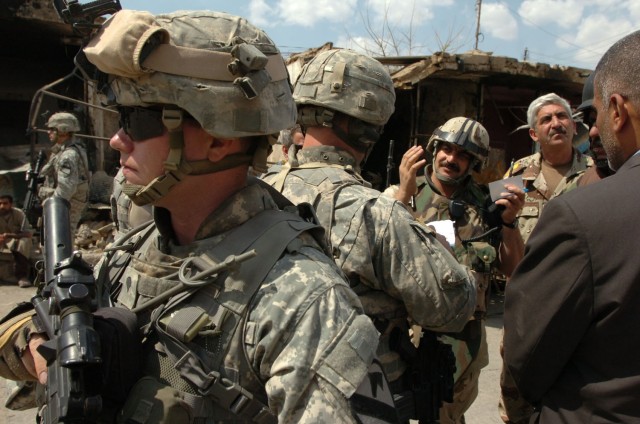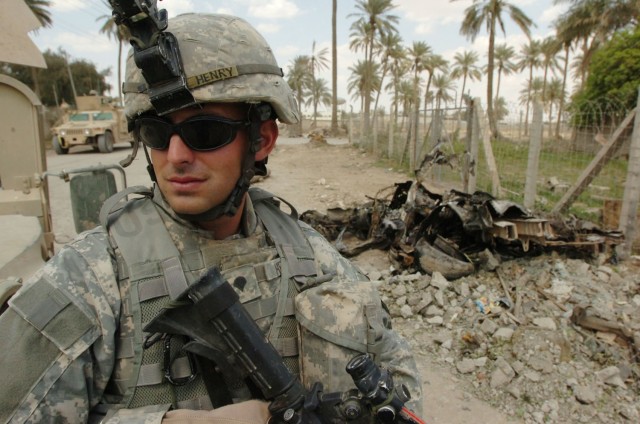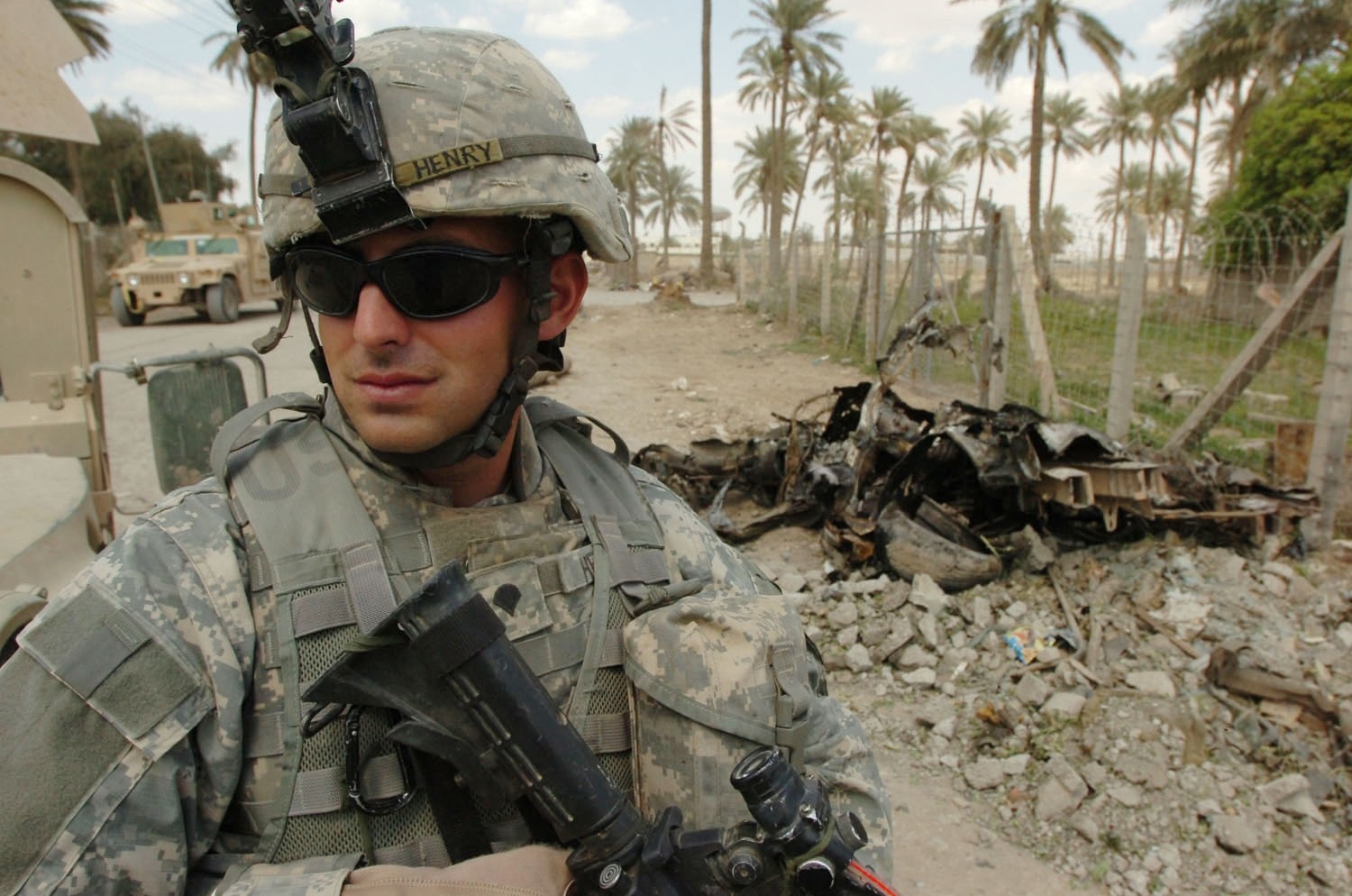FORT HOOD, Texas - When the Soldiers of 1st Squadron, 12th Combined Arms Battalion, 3rd Brigade Combat Team, 1st Cavalry Division, began their deployment, their area of operation was virtually shut down due to the increased spread of violence and destruction.
The markets were closed and the leaders of the city, if not corrupt, had no power.
Most families were displaced, running because al-Qaeda and other insurgent groups plagued the population with gunfire and explosions.
This city with a population of 300,000 is the capitol of the Diyala province in Iraq, and it became the primary responsibility of 1-12 CAB November 2006.
Besides the city, 1-12 CAB also fought in the surrounding area with terrain that included wide desert, palm groves, small villages and orchards.
The area reached its bleak state through a series of events that occurred before the battalion arrived.
In January 2005, Iraq held democratic elections, but the Sunni Muslims boycotted the voting, leaving them out of the political system. The same situation happened in Diyala, and the Shia Muslim minority primarily held the political power in the province.
With the Shia in power, the Sunnis soon became disenfranchised with the new government because they had been in power under Saddam Hussein's regime.
By October 2006, the government in Baqouba was almost non-existent, said Lt. Col. Morris Goins, commander of the 1-12 CAB "Chargers."
"There was a mayor of the city of Baqouba," Goins said. "We would meet with him (and the Sunni sheiks) every Monday... to discuss the many issues on the table at the time.
"It was a very awkward situation because the mayor of the city didn't own a budget," he said, "so anytime the subordinate communities... had problems they had to go through the provincial council, which cut the mayor completely out of the loop. The mayor was a figurehead; the people would come to him but he didn't have the ability to move or accomplish anything."
The Iraqi Security Forces were also struggling. The leader of the 5th Iraqi Army Division at the time was Staff Major General Shakir, a Shia Muslim who used his power to oppress the Sunnis of the province with broad-sweeping operations similar to those used during Hussein's regime.
Hundreds of Sunnis were arrested in these operations, which sometimes occurred during Ramadan, the holiest of Muslim holidays.
"I think he had a hard time changing that because that is what he has been taught and trained," said Goins. "To come off that mindset was very difficult for him."
Baqouba was also suffering from al-Qaeda and other insurgent groups, a product of Abu Musab al-Zarqawi, the former leader of al-Qaeda in Iraq, who declared Diyala as the new capitol of the Islamic State of Iraq in April 2006.
"Between that and the surge in Baghdad... al-Qaeda ran to Diyala," Goins said.
Goins said Zarqawi's proclamation had a psychological effect on the people of Diyala.
"My belief... is that rumor control becomes reality, unfortunately, in Iraq," he said. "It is very hard to counter rumor control with the facts, (because) it is much easier to believe rumor than it is to believe the facts.
With the city already in a state of desolation, it was up to the Charger Battalion to turn things around, which would prove to be a complicated task.
"(The problems) were so complex that I didn't think we could ever solve them," Goins said. "There were days that I thought that they were so complex that it would take the entire U.S. government to come over there and fix it or at least get their hands around it."
Goins said that almost from the beginning the battalion was in for the fight of its life.
"When we arrived it was quiet for about two weeks, and then after two weeks, all hell broke loose," he said.
"We fought every day, except two, where we either fired at or fired upon... until about March," he said.
One of the first events that crippled the city after the Chargers arrived happened in Buhriz, a neighborhood of Baqouba. In December 2006, al-Qaeda overran the Buhriz Iraqi Army and Iraq Police stations.
"Once they were seized by al-Qaeda, and the al-Qaeda flag was raised above them, we went down to take that ground back," said Goins.
When the battalion took back the stations, they stayed there so the ground would not be lost again, he said.
"We occupied two outposts a lot sooner than we would have, (and they were) probably not in the best tactical locations that we would have selected if we had the time to choose where we would have placed outposts," said Goins.
Even worse than the strategic pressure put on the battalion was the effect it had on the populace.
"The Iraqis could look around and see that their police department had fled, and their army had fled," said Goins. "Although they had enough equipment and munitions, they just basically lacked the courage to fight.
"When they departed, not only did we have to go in and defeat al-Qaeda in those locations that the Iraqi Police and the Iraqi Army left, now we had to build the confidence of the people back in the Iraqi Army and the Iraqi Police," he said.
The 1-12 CAB worked in conjunction with other units in the surrounding areas to diminish al-Qaeda's foothold in the city, but their operations were not enough contain the spreading violence.
The Chargers could clear, but holding the area was near impossible.After seven months of hard fighting, the Charger Battalion finally got their big break: Operation Arrowhead Ripper - a large operation in conjunction with the troop surge in Baghdad.
The operation lasted until August and put more Soldiers in the city.
"I would say that was a turning point because you had... three line battalions in that city," said Goins. "You can turn... anything in the world with three line battalions."
On the first day of the operation, the battalion had their last death for the deployment, totaling 28 Soldiers killed in action. After the operation, the tables turned and the battalion had al-Qaeda on the run.
The city changed dramatically after Arrowhead Ripper. Markets were open, the government began to function again, and food and services started to come back.
Goins said he was genuinely and happily surprised with the way the deployment ended - a success that was clearly seen in the faces of the citizens throughout Baqouba.
"With Arrowhead Ripper you could see the change coming, but I would have never thought (the deployment would end the way it did)," he said.
The commander also said the Soldiers of his battalion are not the only ones who should be praised for their dedication and sacrifice.
"Soldiers get a lot of attention and get a lot of pats on the back - nowhere near enough, but the families of this battalion, what they went through and how they held up to that, my hat is off to them and I will forever be in their debt," he said.
Goins said he believes he has had the honor to command the greatest Soldiers in the Army.
"(1-12 CAB) is a cohesive unit that would take on the world," he said. "I would not want to be an opponent facing the Chargers."






Social Sharing